1125 Greek myths for the age of anime
Greek Mythology: The Gods, Goddesses, and Heroes Handbook, From Aphrodite to Zeus, a Profile of Who’s Who in Greek Mythology
by Liv Albert, illustrated by Sara Richard
Toronto: Simon & Schuster (Adams Media), 2021
$22.99 / 9781507215494
Reviewed Linda Rogers
*
 “He said, she said.” Oral storytelling is like court evidence without benefit of cell phones. The stories transform in the telling, just like the circle game where a secret revealed in the beginning is an altogether different story when it spills from the mouth of the last teller.
“He said, she said.” Oral storytelling is like court evidence without benefit of cell phones. The stories transform in the telling, just like the circle game where a secret revealed in the beginning is an altogether different story when it spills from the mouth of the last teller.
Greek mythology, unlike gossip and folk songs, has held pretty static over the millennia. The patriarchy smiled on stories that maintained the status quo and so the translation of Homer by men from Hall through Graves, Pope and Fitzgerald, was the domain of men in service of monarchy and colonisation, not to mention the perpetuation of female subservience.

Liv Albert’s cheeky bibliography, with the exception of the delightfully two-spirit Stephen Fry and a few other male allies, consists mostly of women, and that is as it should be. As patrimony that brought the rise and ruin of empires and destruction of world cultures, not to mention environmental collapses, the old knowledge keepers take their places in Albert’s Greek Mythology to rebuild the hive with stories unvarnished by male vanity, indeed with humour, as Gods and Goddesses, humanly fallible as they were in the first telling, stumble about Olympus tripping on hubris, as heroes will.
We have already learned about the parallel lives of Gods and Humans in every culture from the Greek and Roman to the West Coast of Canada, where Victoria writer Albert may muse on the parallel behaviour of ancient Tricksters and the Fools still dancing at revived Coastal potlatches. In every case, modern civilisation has attempted to usurp matriarchy and rearrange the sky over Olympus and the Northwest Coast alike. That is an imbalance Albert seeks to address in her very contemporary list of ancient biographies.
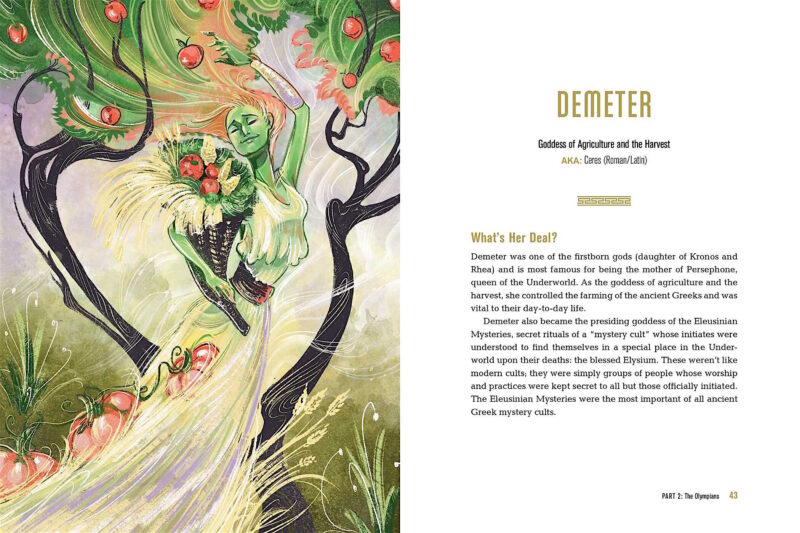

From Africa we have borrowed shibboleths, proverbs, and compressed storytelling. “It takes two to tango,” “There are two sides to every story.” The humour bubbling in Greek Mythology is Albert’s insistence on presenting options, choosing your own endings. Was Penelope — the wife who undid her weaving every evening, betraying her fingers-crossed promise to the dozens of suitors looking for real estate, her bed and domain — a noun or a verb as she stood by her philandering spouse?
So many women have been nouns, pretty things, in the stories of our ancestors, while the hunters hunted. They were even denied the prerogative to tell their own stories. Hence we have Penelope as described and Indigenous children ripped from their families and oral tradition by wily colonists. It is all the same, as is history or herstory, which, as they say, never changes.
In the capricious behaviour of the gods and heroes of ancient times, we see rhyming tides that reflect the phases of the moon. Politics and psychology, which determine the human story, make these legends relevant, even though giving evidence of misbehaviour, pride, and avarice may not signal evolution. “Most of the ancient Greek heroes lacked the more compassionate aspects of true heroism,” Albert notes.
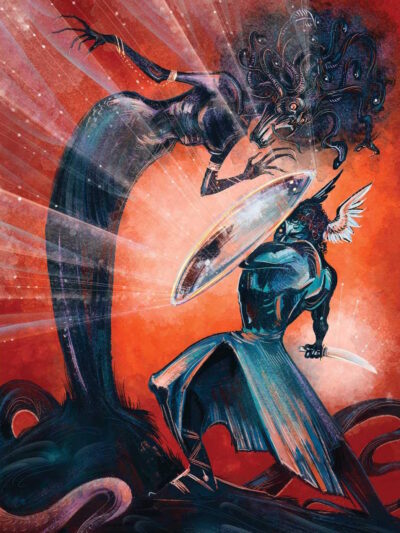
We never seem to learn from the over-populated myths of the commerce-connected empires of the Mediterranean Sea. The story of Perseus, conceived in a golden shower, has to anticipate the prurient narrative of a morally compromised American politician in a Moscow hotel room. The beat goes on, as do the apocryphal tales.
Repetition starts in infancy, where songs and stories are told and sung to shape the next generation of nouns and verbs. Che sera sera. What will I be? is the question dangling like a cartoon bubble over every cradle.
*
This book was written to intrigue a new generation of classical scholars, ones who have been raised on Japanese anime and the new feminism, Wonder Woman and Mulan, and it should succeed as young readers dial into the traditional infrastructure of their life and literature with the option to perceive more flexible role playing by the main characters, particularly the perception of women in a world where healers and medicine women were deformed into witches, and activists like Jezebel and Joan of Arc into caricatures, not unlike the transformation of Hilary Clinton by the American right.

His (Zeus’s) punishment directed at the humans (after Prometheus brought them fire) was simply the creation of women…. (Pandora) was simply evil and thus so were all the women who descended from her.
All the “necessaries” are present here: a clear declaration of feminist intention in the introduction, a refreshing bibliography, helpful index, and illustrations that speak to the visual vocabulary of readers raised in contemporary animation. Like all catalogues of Gods and Heroes, Albert’s Greek Mythology overflows with information — but because of its organisation and pop culture asides, the threads weave readily into sea routes that attentive readers can navigate.
This is all a far cry from the format of classical studies in universities past. My classics teacher was a scholar who read from a book of notes he had prepared fifty years earlier, the pages crumbling as he turned them, as each rosy fingered dawn revealed truths denied by some scholars. My Chaucer professor, who glued three feet of hair into a swirl that barely covered his baldness, wrote a big X across my contention the Wyfe of Bathe was a feminist. Contemporary scholars agree with me.
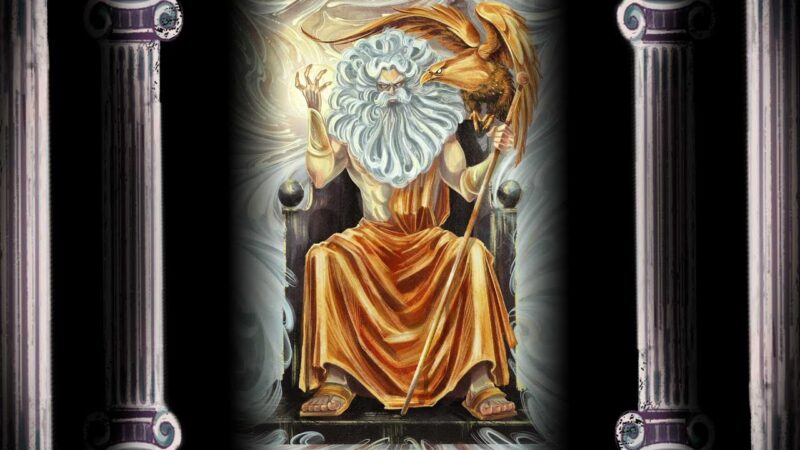
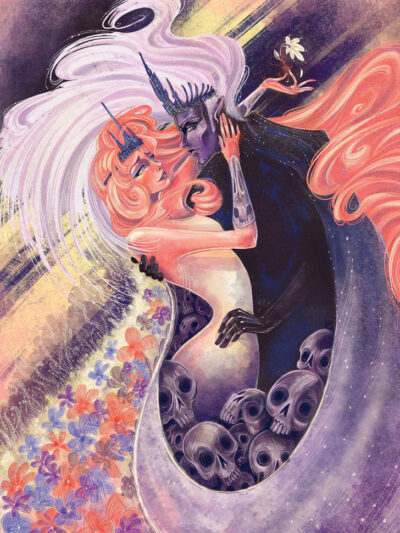
This is a book to delight young people who grew up with cartoon Titans and to inspire them to go back to the old stories, where they will find out that the Gods and Heroes are not much different from humans in their own reality. The might even learn Greek and read the original.
In her examination of the sex lives of Leda and Oedipus, Albert validates the tabloid value of cautionary tales: transgress and repent, or else. The human condition does not survive sexual trauma. The exploitation of men, women, or children is social disruption. We know that. It is as old as Gods and Heroes and as young as anime, the new convention in storytelling.
Albert’s bad guys are badder than ever as they sew their wild seeds everywhere. Her Zeus is less a begetter with legitimate spawn than an assaulter leaving children in his wake as he rages through the tidal life of goddesses and mortals. This has been the prerogative of men, and Albert challenges that notion in acerbic asides.
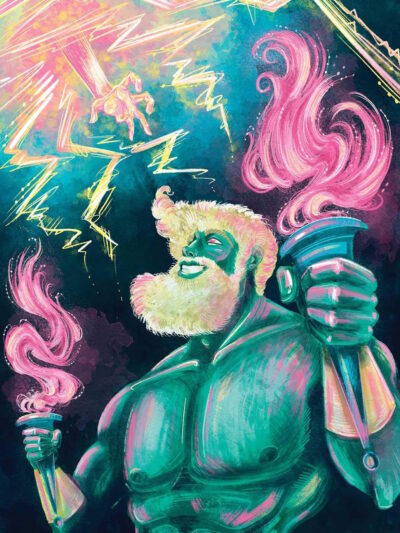
She also references pop culture, an aspect of Greek Mythology that dusty scholars may find irritating, but referencing movies and books like Harry Potter brings the messages alive in context for young readers, for whom this handbook can be an end or a beginning. Not everyone is going to learn Greek and Latin to study the ancients, but anyone can benefit in the moment from the stories and wisdom imparted by affectionate translation.
Hermes inhabited the role of “trickster god,” a common trope among ancient mythologies…. You probably remember him from Disney’s Hercules, in which he’s the cool, fast talking, sunglasses-wearing companion and messenger of Zeus.
This is the convention of comic books, guaranteed to engage young readers.
The Japanisation of contemporary western illustration is driven by anime, which presents action figures in moral adventure. Sara Richard’s paintings magnify the intention of the author, lifting legend off the page and into a fresh genre, giving new energy to the reading of old stories. Although they do not subscribe to anime conventions like big heads and eyes, Richard’s characters move with the vitality of anime that young readers have come to expect, with girls and women holding up their half of the sky.
These young women are the target market as they dodge the conventional wisdom that no girl can be pretty enough or wise enough, the apparently conflicting desiderata. Comb-over scholars might lose their glue over this book, but they have their own libraries, their own cobwebbed cells for intellectual self-abuse. Liv Albert’s Greek Mythology is a new book for a new generation, and, just as we have learned to open windows to combat corona virus, so we can open our minds to these fresh perceptions.
*
Linda Rogers’ Empress Trilogy is now complete with the publication of Repairing the Hive (Ekstasis). Studio 123 is about to print her pandemic collection, Mother, the Verb, the Swan Sister Treasure Book — the mythological journeys of forty plus artists. When she skydived off Baba Daji (father mountain!) in western Turkey, she witnessed the traffic of the ancients in the sea and sky lanes of the Mediterranean. Editor’s note: Linda Rogers has also reviewed books by Amanda Hale (Mad Hatter), Howard White, Eufemia Fantetti, Patricia Demers, Amanda Hale (Angela of the Stones), for The Ormsby Review. Her book Crow Jazz (Mother Tongue Publishing, 2018) is reviewed by Paul Headrick.
*
The Ormsby Review. More Books. More Reviews. More Often.

Publisher and Editor: Richard Mackie
The Ormsby Review is a journal service for in-depth coverage of B.C. books and authors. The Advisory Board consists of Jean Barman, Wade Davis, Robin Fisher, Cole Harris, Hugh Johnston, Patricia Roy, David Stouck, Maria Tippett, and Graeme Wynn. Scholarly Patron: SFU Graduate Liberal Studies. Honorary Patron: Yosef Wosk. Provincial Government Patron since September 2018: Creative BC
“Only connect.” – E.M. Forster
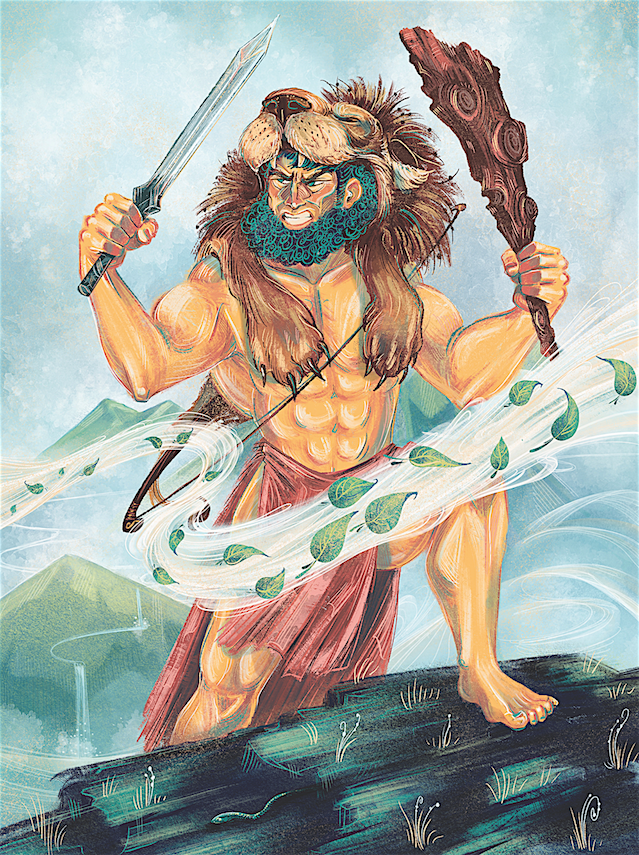
4 comments on “1125 Greek myths for the age of anime”
Wow. Women Warriors rule! I love the way you set up your reviews so that we are intrigued by the field around the words and drawn in.
Thank you, Linda! What did a friend say… YPSD. Years of practice and self-denial.